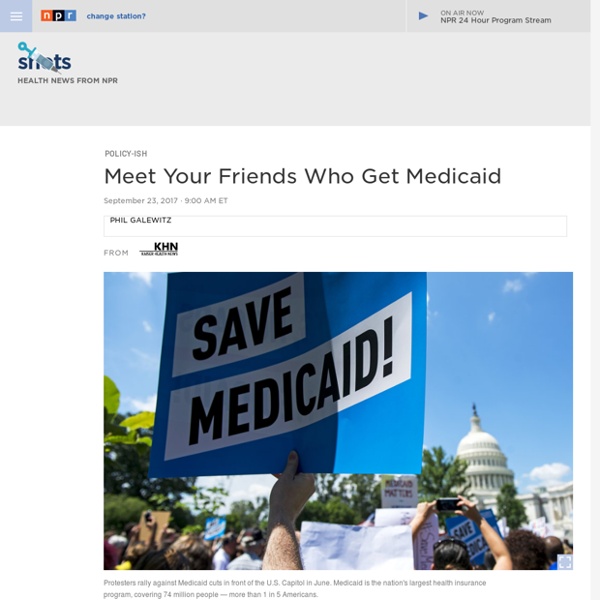Some States Spend Billions on Economic Tax Incentives for Little or No Return
By one estimate, state and local governments spend at least $45 billion a year on tax breaks and other incentives to lure or keep job-producing businesses and plants in their jurisdictions. New York, for example, plows billions of dollars into the Empire State Development Corp. and Democratic Gov. Andrew Cuomo’s signature Start-Up NY program. For more than three decades, Florida has offered an array of tax incentives to businesses that locate, invest, and hire in the state’s distressed areas through an initiative called the Enterprise Zone Program. Related: The Growing Funding Gap for State Pensions Puts Millions at Risk
Medicaid work requirements: Where do they stand after the blue wave?
The 2018 midterm elections have dealt a significant setback to President Trump’s agenda in the legislative arena. However, there are still many ways for the Trump administration to keep swinging away at the Affordable Care Act. One particularly effective unilateral instrument is the regulatory process – that is, the implementation of statutory law by executive agencies.
25-year-old Kenyan invents gloves that convert sign language into audio speech - Pulse Kenya
More than 30 million people around the globe have speech impairments and must rely on sign language. Roy Allela’s six-year-old niece was born deaf and found it extremely difficult to communicate with her family, none of whom knew sign language. They say necessity is the mother of invention and the need to communicate and connect with her niece pushed 25-year-old Roy to invent the smart gloves. More than 30 million people around the globe have speech impairments and must rely on sign language, which poses a language barrier when seeking to communicate with non-sign language users. It is something Roy Allela’s knows too well. Roy Allela’s six-year-old niece was born deaf and found it extremely difficult to communicate with her family, none of whom knew sign language.
Republicans rigged our democracy. Here's how Democrats can fight back
Donald Trump wasn’t elected because Democrats lost a policy fight in 2016. What Democrats did was lose a procedural fight that has been going on since the early 1990s, when Republicans began waging a relentless, brutal, and completely one-sided war, systematically using their lawmaking power to disadvantage their adversaries in elections and political mobilization. Gerrymandering, the Citizens United atrocity that declared money is speech, blocking US supreme court nominations and obstructing legislation are some of the Republican party’s tactics.
Eerie Photos of History's Deadliest Pandemic
In 1918, it is estimated that about 500 million people — or about one third of the world’s population — caught influenza, otherwise known at the time as the “Spanish Flu." It was the deadliest disease outbreak in recorded history, with between 50 million and 100 million people worldwide being killed. In the United States alone, 675,000 died and the average life expectancy fell by about 12 years between 1917 to 1918. The virus spread quickly because of World War I, with soldiers in close quarters passing the disease to one another then traveling far and wide, spreading the disease throughout the world. There was no vaccine at the time to protect against infection (the first licensed flu vaccine didn’t appear in the US until the 1940s) and there was no antiviral medication to treat it once infected.
Bill in Congress Could Help People With Disabilities
People with disabilities who need help with basic daily activities could be entitled to long-term services at home or in the community under bipartisan bills introduced Tuesday in the U.S Senate and House of Representatives. The Disability Integration Act of 2019 would guarantee that eligible people with disabilities are offered services in the community. Those already living in institutions would need to be informed about available options in the community.
Donald Trump: The Dress Rehearsal for Fascism
Republican presidential nominee Donald Trump speaks at an event hosted by the Republican Hindu Coalition in Edison, N.J., on Saturday. (Julio Cortez / AP) Americans are not offered major-party candidates who have opposing political ideologies or ideas.
The treasure trove of unique genomes hiding in plain sight
Jenn Liv There’s a boxed warning that comes along with Plavix, the anti-blood-clotting drug that hit the market in 1997. If you’re a “poor metabolizer,” it warns, the drug may not be effective for you and might even lead to negative effects. How do you find out if you’re a poor metabolizer?
Katie Price is right. Disabled people shouldn’t be forced off the internet by abuse
What sort of person repeatedly picks on a disabled child in the most vicious and cruel of terms? The answer, of course, is the sort of people the model Katie Price had in mind when she started campaigning for online abuse to become a specific criminal offence. Price’s 15-year-old son Harvey – who is blind, autistic and has Prader-Willi syndrome – has been hideously mocked and taunted. His mother quickly gathered more than 220,000 supportive signatures for a petition demanding online abuse be treated as a hate crime, and now the parliamentary petitions committee has accepted her argument that the law isn’t fit for purpose – or to be precise a part of that argument.



